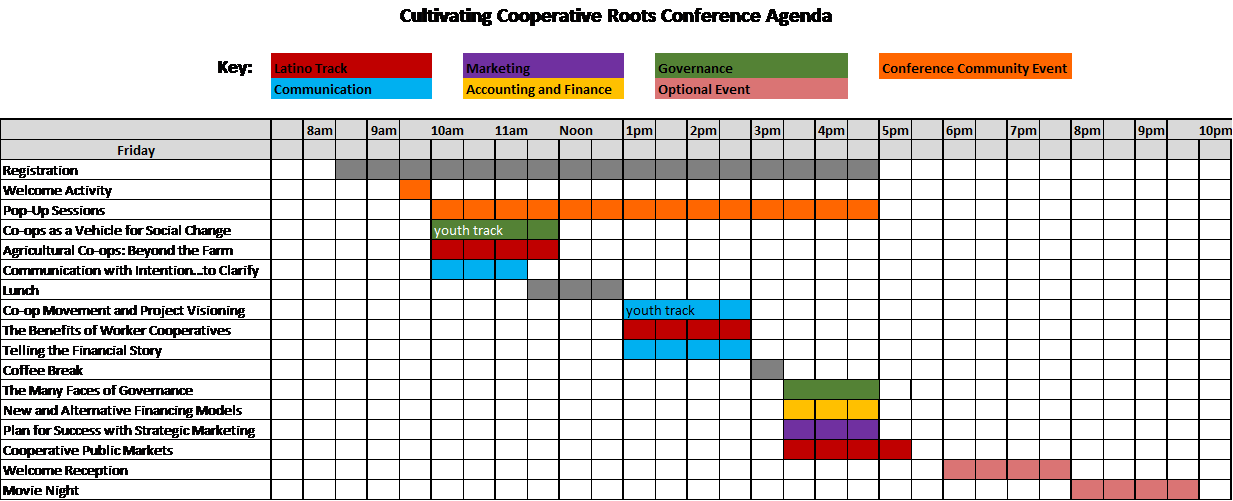9:30-10:00am – Welcome Activity
Join us for a brief introduction of the conference goals, meet your fellow conference attendees, and win a prize.
10:00am-12:00pm
Co-ops as a Vehicle for Social Change – Anna Isaacs (207)
Café Session: In the United States, the food system is connected to class and race—who produces food, who has access to healthy food, and who disproportionately feels the negative impact of the food systems. Access to food and interaction with healthy food is influenced by both class and race. We want cooperatives to be a vehicle for addressing and solving these issues. Internationally, regionally and locally there is much to learn, and we are lucky to have leaders join us for this workshop to share how they are doing cooperative work, while also challenging and expanding what cooperative work looks like and can do. There are 7 Cooperative Principles. We want to share them with you and use the last 3 principles as a tool to root us in why we are all here at this conference and set intentions for our time here together. (Communication, Governance) (This session is part of the Youth Track but is open to all!).
Agricultural Co-ops: Beyond the Farm – Javier Gonzalez, Jaime Villalaz, Rodrigo Cala, Aaron Blythe, and Pakou Hang (206C)
Panel Discussion: Farm incubator cooperatives – Learn more about the Agua Gorda Cooperative experience beginning as a micro-farm in 2012 and growing to purchase a 54 acre farm of their own in 2015.
Marketing cooperative – Presentation by Rodrigo Cala, Co-president of Shared Ground Farmers’ Cooperative and Aaron Blythe, Shared Ground staff
Farmland ownership cooperative association – Presentation by Pakou Hang, Hmong American Farmers Association, describing 155 acre HAFA farm with 20 individual Hmong farmers. (Communication, Governance, Marketing, Accounting and Finance) (This session is part of the Latino Track but is open to all!)
Communication with Intention…To Clarify – Molly Gibbs (206B)
Workshop: Learn the best practices for engaging and communicating with your co-op members as well as how to maximize your volunteer base. (Communication, Marketing)
11:30am-1:00pm – Lunch
1:00-3:00pm
Co-op Movement and Project Visioning – Anna Isaacs (207)
Workshop: We build stronger businesses, food systems, and organizations, and community when we are equity-driven. As you begin to create or expand your co-op you should address these three questions:
- What need of your community do you want to address?
- How do you envision addressing this need, what’s the concept of your project?
- What are some obstacles you foresee in this project and ideas to overcome them?
(Communication)(This session is part of the Youth Track but is open to all!).
The Benefits of Worker Cooperatives – John Flory and Vanessa Bransburg (206C)
Panel Discussion: An overview of the founding and success of janitorial worker cooperatives in several states. (Communication, Governance) (This session is part of the Latino Track but is open to all!)
Telling the Financial Story- Mieka Briejer (206D)
Workshop: “Telling the financial story” will focus on two areas, 1) Discussing finances, which is often a high stakes conversation and can be difficult, and 2) The importance of looking at financials over time, asking, “What are the trends?” and “How do you relate the company’s performance?”.
3:00-3:30pm – Coffee Break
3:30-5:00pm
The Many Faces of Governance – Joe Garrison, Laura Ridenour, Emma Thomson, John McNamara (Moderator) (207)
Panel Discussion: Comparison of consensus, policy governance, parliamentary procedure, and Sociocracy. What will work best for your organization? Questions for the panelists will be designed to elicit responses that relate to how a particular governance style reflects the culture and needs of the particular co-op. They will not attempt to raise one method over another, but to give the audience a sense of how varied governance decision making processes are within the greater co-op community.(Governance).
New and Alternative Financing Models – Joel Williamson and Teri McKenzie (206D)
Workshop: This presentation will include an overview of the accounting and legal principles governing cooperatives, including corporate governance laws, employment laws and tax / accounting rules and regulations. We will explore:
-Private Lending Club – Local Vision Investing
(Accounting and Finance)
Cooperative Public Markets – John Flory and Nathan Teske (206C)
Panel Discussion: Presentation by John Flory of Latino Economic Development Center describing Cooperativa Mercado Central in Minneapolis, a Latino market that opened with 47 micro businesses in one building 16 years ago. Also, hear from Nathan Teske describing the Portland Mercado which opened in Portland, Oregon in 2015. (Communication, Marketing)(This session is part of the Latino Track but is open to all!)
Plan for Success with Strategic Marketing, Terri Krohn (206B)
In this presentation you will learn how to make your marketing efforts more productive through effective marketing planning. (Marketing)
6:00-8:00pm – Welcome Reception
8:00-10:00pm – Movie Night (207)
Join us as we screen, Food for Change, an 82 minute documentary that examines the role the food played, and continues to play, in our social and economic systems. Stick around for a few minutes after the film for a lively discussion!
